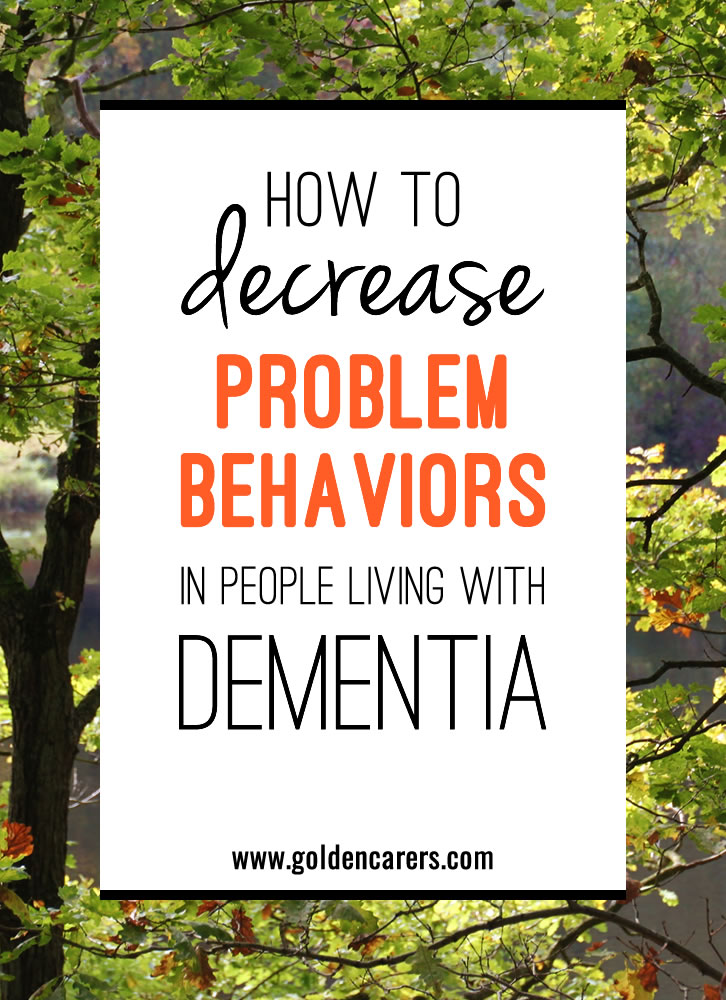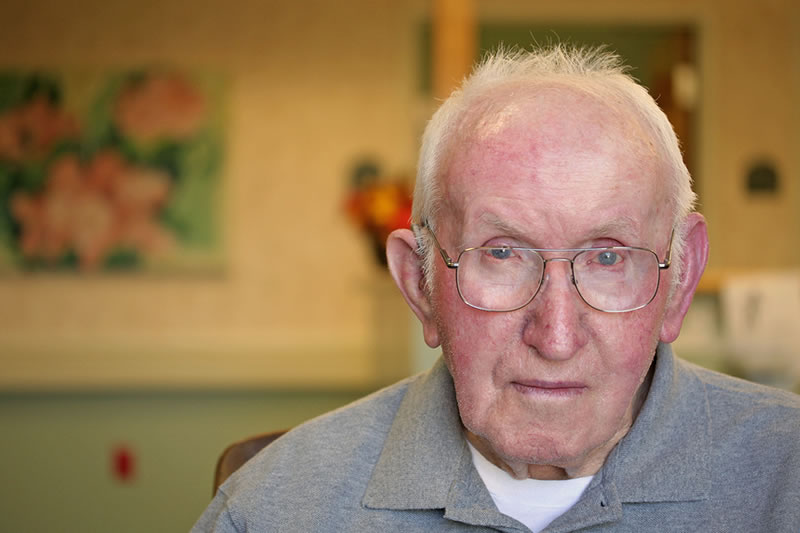
How to Decrease Problem Behaviors
By Susan Berg United States
Found In: ›Activities ›Articles ›Alzheimer's & Dementia

Golden Carers has 1000s of activities and resources for senior care.
Working with people living with dementia, especially those with problem behaviors, can be challenging. How can you make the best of any situation?
8 ways to bring the best out of people
1. Exude a Positive Attitude
First, you need to have a positive attitude and be smiling and upbeat. Leave your problems at the door. A person with dementia takes cues from you so if you are smiling, happy and upbeat; there is a good chance so will she.
2. Say Hello
When you walk in the door, make sure to say hello to everyone. You never know when you will need someone's help or will be caring for a particular resident.
3. Smile
Studies have shown that the simple act of smiling puts you and the resident in a better mood. Thus make sure you are smiling and remind the residents to smile.
4. Give Compliments
Besides saying hello and smiling, you can be complimentary. All people tend to be in a better mood if you say something nice about them. In fact, try challenging yourself to get to know what it takes to make each resident’s day. Learn what makes each resident tick and how to make her feel good about herself.

5. Learn About the Residents
Learning about the history, background, and interests of your residents is essential.
Case Study: A Resident who worked as a Pharmacist
We had a resident who prided herself on looking good. However, towards the end, she did not look or feel good despite our best efforts. Staff, who did not know her, kept saying that she looked beautiful. This resident knew that she did not look beautiful. This made her feel bad.
Several of the activity assistants took time to learn about her history. They found out that she was a pharmacist. The staff complimented her on being able to have such an important job especially during a time when women did not pursue this type of career.
They took the conversation one step further and asked her opinion about injectable drugs for psoriasis. Not only did this resident forget about her looks and how bad she felt, but she became very animated and was thrilled that she was being asked for her opinion.
6. Focus on feelings
Remember it's all about feelings when interacting with a person who has dementia. In the early stages, these individuals often realize that something is wrong. Sincere compliments make them feel better. In the later stages, emotions may be the only thing that they have left because feelings are the last thing to go in a person with dementia.
7. Provide activities that are failure free
Adapt and modify activities so they are success oriented and failure free.
8. Ask for Help
Everyone likes to feel useful. Make sure you tell the residents that you need their help.
Communication among caregivers is key
When dealing with problem behaviors, communication among caregivers is critical. Family members and staff need to be on the same page. All staff members need to communicate what they know about each resident so other staff do not need to discover things about the resident that were known by others.
This is especially important when dealing with problem behaviors. Everyone needs to know what the triggers are that set someone off and try to avoid doing these things if possible.
What to do when problem behaviors arise
There are times when some people with dementia become agitated and display other unwanted behaviors. Try to find out what is behind the behavior: sickness, sadness, environmental factors, fatigue, depression, or provocation. Clinical staff may be able to help you. If the problem is intrusive or aggressive, separate them from other residents, because one person’s agitated behavior can easily spread to others.
Try to find out how the person is feeling and empathize and console. Remember that body language and other non-verbal forms of communication can help immensely. Be aware that if the behavior is not managed appropriately, the situation may escalate.
3 Strategies for managing problem behavior
1. Try to refocus and redirect attention
Despite everyone’s best efforts, you might just sense that the problem behavior is escalating. It is best to stop what you are doing. Help the person with dementia to calm down, by refocusing and redirecting his attention.
2. Identify 'Stop' Behaviors
Everyone needs to know what works best to stop these unpleasant behaviors. That is why knowing the resident is critical.
Here are some things that worked most of the time for me, my staff and others caring for the residents.

Case Study: Disruptive behavior during activities
We had a higher functioning resident with dementia. She would start calling out and generally being disruptive during activities. I tried letting her be my assistant. I let her ask the trivia questions, lead the songs during a sing-a-long and help less able residents during activities. I was surprised at how well this worked.
Unfortunately, her dementia advanced so she was less and less able to help, but I continued to let her do what she could. I even gave her a name tag with, volunteer activity assistant, written on it.
For lower functioning and other residents with dementia, giving them a task which requires their attention so they are not disruptive, may help.
Case Study: Tasks that focus on specific interests
What comes to my mind is a resident who loved chocolates and oranges. We would give her wrapped chocolate pieces. We asked her to unwrap them so she could eat them. She really concentrated on this task so she could get to eat the chocolate candy.
She also loved oranges. I asked her to peel the oranges. This might keep her busy for an hour. Eventually, her decline made it impossible for her to do this. I tried giving her ears of corn to shuck and hard boiled eggs to peel. Sometimes it worked.
However, as I said earlier, you must know the resident to find what activity might keep them calm. Sometimes the resident may get agitated, so immediately refocus and redirect their attention.
3. Never Argue
Another must, is NEVER argue with a person who has dementia. This is one thing that will set off most. Instead enter her reality.
Case Study: Resident who thought she was 40 and worried about her children
For example: we had a resident who always thought that it was 1985 and she was forty years old. She would worry about her kids or having to make dinner for her husband. We told her that the neighbor was picking up her children.
We sometimes had staff call her pretending that she was her neighbor. She would remind the resident that it was her (the neighbor’s) turn to pick up the kids. Most often this would calm the resident.
Another strategy was to write the resident a note stating that it was the neighbor’s turn to pick up the kids. We even signed the note with the neighbor’s name. The note was a good idea because the resident had poor short term memory. She could look at the note and was reminded over and over again.

Common Activities that often work
- Sorting
- Write a note to the resident explaining the answers to questions he asks over and over again
- Household chores like setting the table
- Taking a walk
- Untangling yarn
- Wrapping yarn around cardboard to make pompoms
- Making a simple necklace with cheerios
- Looking at or fiddling with a bottle of colored water with oil in it
- A warm water bottle covered with fleece
- Mittens, muffs or gloves especially when it is cold outside
- Looking at a picture book or reading simple sentences
- Singing a favorite song
- Stuffed animals especially interactive ones
- Conversations, sensible or non sensible ones
- Having one resident tell you what he thinks a non verbal resident is thinking
- Using a calculator
- Eating and drinking
- Combing hair
- Light touch massage
- Writing a favorite recipe or looking through a cookbook
- Water pillows
- Fiddle aprons or blankets
- Weighted blankets similar to a thunder jacket for dogs
- Simple arts and crafts like coloring or using chaining
- Play dough
- Simple gardening
I know there are many more ideas. It is best to use trial and error to see what works the best.
Simple group activities that can diffuse unwanted behavior
- Card Games
- Dice games
- Sing-a-longs
- Made up stories about a song or anything
- Chicken Soup for the Soul stories
- Simple exercises
- Simple ball and balloon games
- Simple trivia and fill in the blanks
- Simple word games
- Simple math games
- Reminiscing
- Fun with stickers and sticky note paper
- Simple patriotic activities
- Multi-level activities
- One to one within a group
- Greeting activities
- Parties
- Simple sports games
- Practicing good behavior games
The truth is that it is not easy
The truth is that it is not easy. There is no magic bullet. Using these strategies will provide you with the best possible outcome. However, it can be challenging every single day.
What works one day may not work the next. I hope you will find these ideas useful. If you have a question about a specific situation, please leave a comment below.
Related Activities
Comments Post a Comment
 29th Jul 2022
Healthcare professional
29th Jul 2022
Healthcare professional

 30th Jul 2022
Activity Director
30th Jul 2022
Activity Director
Education and communication are key
Have and services to educate staff on the customs and preferences of people of different ethnic backgrounds
Ask for help from the family or others who have a similar background
Make sure everyone shares information that they have found and utilized
The truth is it is not easy
Here are some other articles that may help
https://www.goldencarers.com/search/?search_tag=Activity&search=Behaviors
Do you have a specific resident with a specific background that you can tell me about that you need help with or is this a general question??

 8th Oct 2021
Activity Director
8th Oct 2021
Activity Director
Does he know what number he is dialing
I had a resident who like to call her family all the time
She called my home number and I told her to leave a message and so you could have this person call a number but the voicemail and tell him to leave a message
 25th Jul 2021
Healthcare professional
25th Jul 2021
Healthcare professional
 1st Aug 2021
1st Aug 2021
 30th Sep 2020
Activity Coordinator
30th Sep 2020
Activity Coordinator
 4th Oct 2020
4th Oct 2020
 13th Apr 2019
Activities
13th Apr 2019
Activities
 22nd Jan 2019
Family Caregiver
22nd Jan 2019
Family Caregiver
 27th Jan 2019
27th Jan 2019
 6th Feb 2018
Activity Director
6th Feb 2018
Activity Director
Today I remember that she loves to sing, so I put her favorite music, she started singing that she forgot to go around and around in circles.
 10th Feb 2018
10th Feb 2018
 30th Jan 2018
Recreational Activity Officer
30th Jan 2018
Recreational Activity Officer
Another way of decreasing problem behaviour is ball room dancing. I find this very effective where everyone loves to sing and dance especially their old favourite music.
 4th Feb 2018
4th Feb 2018
 24th Jan 2018
Diversional Therapist
24th Jan 2018
Diversional Therapist
Regards
Ros
 27th Jan 2018
27th Jan 2018
 9th Sep 2017
Recreational therapist
9th Sep 2017
Recreational therapist
Thanks so much

 11th Jun 2017
11th Jun 2017

 6th Jun 2017
Facility Manager
6th Jun 2017
Facility Manager
 5th Jun 2017
Activity Assistant
5th Jun 2017
Activity Assistant


 17th May 2017
Activity Director
17th May 2017
Activity Director

 Easy Group Cooking Ideas for Dementia Care
Easy Group Cooking Ideas for Dementia Care
 13 Ways to Provide Resort-Style Hospitality in Activities
13 Ways to Provide Resort-Style Hospitality in Activities
 How to Build Positive Relationships with Residents
How to Build Positive Relationships with Residents
 Annual Report Sample
Annual Report Sample

